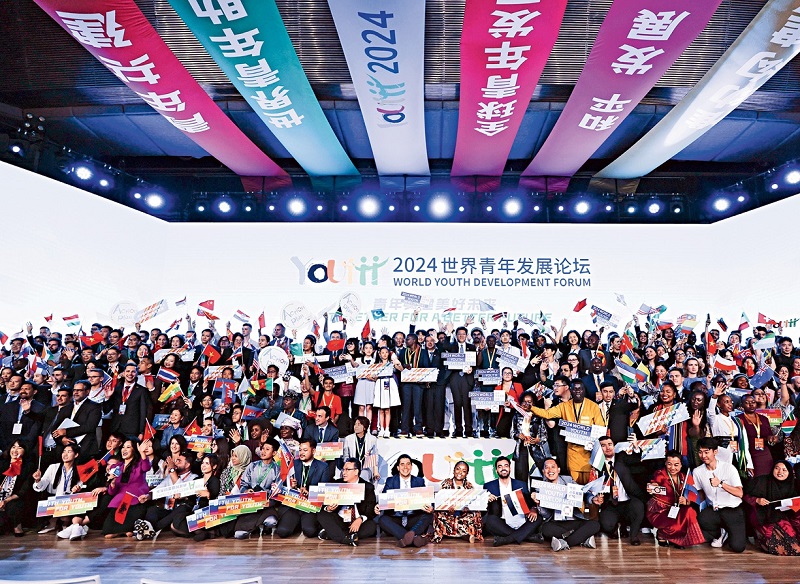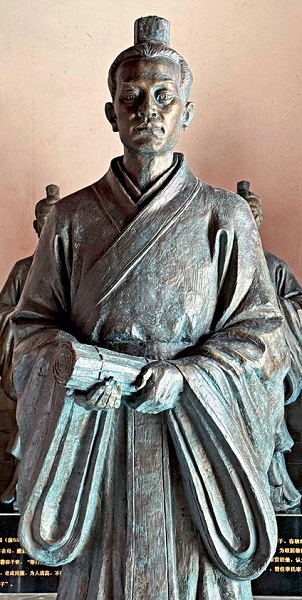
The World Youth Development Forum opens in Beijing on August 12, 2024. It was attended by over 2,000 representatives from more than 130 countries and 20 international organizations, participating both online and offline.
What does fairness mean? In English, the original definition of the word “fair” includes the meaning of “beauty” and “harmony,” obviously referring to people’s longing for good prospects in life. In Arabic, the word for “fair” includes the meaning of “balance” and “integrity.” In Chinese, the word for fair is “公平”(gong ping). Oracle bones discovered from 3,000 years ago had the character “公” carved on them, which experts speculate might have had something to do with the even distribution of food. Gradually, with the passing of time, the concept of fairness has also evolved, permeating every aspect of people’s lives worldwide.
Today, this universal ideal is manifested in two complementary dimensions: On the one hand, it has transcended geographical, ethnic, and cultural boundaries to become a shared pursuit of all humanity; on the other hand, every ethnic group around the world has their own interpretation and practice of this value.
Fairness often reminds people in European and American cultural circles of equality, meaning every independent individual should enjoy identical rights. This understanding originated from the spirit of ancient Greece, and has continued to guide modern society. The ancient Greeks emphatically looked down on cheating in daily life, as such behavior violated others’ rights.
The Olympics, with its roots in Greece, imposed rigorous scrutiny on all participating athletes and referees. During the 98th Ancient Olympic Games, a boxing athlete attempted to bribe all his opponents to secure his victory. After being discovered, all those involved in the scandal faced severe punishment – their fines were used to make a row of four bronze statues of Zeus, one of which bears an admonishing inscription for future generations: “Olympic victory is to be gained not by money, but by fleetness of feet and strength of body.”
This ethos has been passed down through generations, ultimately forming the modern Olympic principle of openness, fairness, and justice.
When Arabic speakers mention “fairness,” they are likely thinking of a concept that is not limited to legal equality, but rather a sacred duty incumbent upon every individual. This concept is vividly illustrated in a story about how the caliph helped solve three brothers’ inheritance dispute. After their wealthy merchant father passed away, the eldest brother argued that he deserved the largest share due to the contributions he had made to the family business, the second brother claimed precedence for taking care of their parents, while the youngest insisted that he should receive special treatment because he was the youngest sibling. After conducting meticulous investigations, the caliph discovered that although each of the three had unique strengths, they also had distinct shortcomings. Ultimately, he devised a fair and equitable solution taking into account all the three’s actual circumstances.
In the Quran, the sacred book of Islam, Muslims are instructed to care of others, while the system of zakat – mandatory charitable donations – provides relief to impoverished people. These religious and ethical teachings collectively inspire Muslims to pursue fairness and justice in their daily lives.
Like other civilizations, the Chinese nation, since its birth, has continued to pursue fairness in all levels of society. In The Book of Rites (Liji), one of the essential classical texts for ancient Chinese scholars, the lines, “When the Dao is pursued, the common good will reign over all under heaven,” establish fairness as intrinsically linked to the highest philosophical concept in Chinese culture called the Dao (meaning “way”). This foundational philosophy has not only guided China through five millennia of vicissitudes, but also served as a vital spiritual compass in the development of the Chinese civilization.
Confucius and the Confucian school adopted a non-discriminatory approach to education, advocating that everyone should enjoy the right to education regardless of their wealth or status. Among Confucius’s disciples, some came from noble families, like Meng Yizi who was from an aristocratic family, while the majority came from humble origins, like Yan Hui, who never pursued material pleasures and ate only a small portion of rice and drank cold water every day. As Yan tirelessly pursued moral cultivation, Confucius spoke highly of him, saying, “Yan is truly virtuous!”
This educational philosophy of Confucius was much ahead of his time. While many criticized his disciples’ complex social backgrounds, he steadfastly adhered to this ideal all throughout his life. His teachings nurtured a galaxy of talents: Ran You and Zi Lu excelled in state governance, Zai Wo and Zi Gong were master rhetoricians, and many others found their talents in various fields. Due to Confucius’s contributions, he was hailed as “the greatest sage and teacher” in Chinese history.

A statue of Yan Hui in the Confucian Temple in Shiping County, Yunnan Province. Dong Ning
During the Sui (581-618) and Tang (618-907) dynasties, the Chinese people created the imperial examination system based on the foundation of educational equity, thereby advancing social fairness on a grand scale. Prior to this period, political power had largely been monopolized by hereditary nobility, allowing many incompetent individuals to occupy high-ranking positions merely based on their family background.
Take Wang Huizhi (338–386), the fifth son of the renowned calligrapher Wang Xizhi, as an example. Born into the prestigious Wang clan, he secured an official appointment without demonstrating any genuine talent. Later while he was serving under General Huan Chong (328-384) as an official responsible for managing military horses, Huan inspected his work and found Wang incapable of answering even basic questions about his position, such as which government department he worked in, how many horses were under his charge, and the recent horse mortality rate. This system of hereditary appointment had clearly become incompatible with the nation’s developmental needs.
During the Sui Dynasty, China formally abolished the hereditary official selection system and established the imperial examination system to select officials based on a comprehensive evaluation of candidates’ talent, moral character, and scholarly knowledge, setting higher professional standards for government officials.
By the time of the Song Dynasty, the imperial examination system had become more standardized through three innovative mechanisms: First, name-covering, which concealed examinees’ names to prevent any kind of cheating; second, the transcription of the test papers by some other people to block handwriting identification; and third, isolating examiners in designated places to prevent them from leaking the test questions to others.
These institutional innovations established a meritocratic framework that enabled social mobility. Historical records indicate that the majority of high-ranking officials during the Song Dynasty entered officialdom by passing the imperial examination.
China’s fair system of official selection gradually influenced neighboring nations. For example, Japan dispatched envoys, students, and monks overseas to study in China. In the year 701, Japan formally implemented its own meritocratic examination system that was modeled after China’s system. During China’s cultural exchanges with its neighbors, notable figures emerged such as Japan’s Abeno Nakamaro (698-770) and Korea’s Choe Chiwon (in China from 868 to 884) who studied and lived in China for a long time, and passed the imperial examination as foreigners.
Later, some of them became officials in China and wrote many poems and articles that have been passed down to this day, while others returned to their homelands and made significant contributions to the development of their countries.
Today, the Chinese people have gradually established a social equity guarantee system that focuses on equal rights, equal opportunities and fair rules to ensure the rights to equality in participation and development. Chinese love of fairness and peace has been a focus of its culture since ancient times. China has been pursuing fairness in its own development as well as in its international exchanges. In today’s ever-changing world, the spirit of fairness is particularly important. Only through cooperation can people around the world better address various issues and create a better tomorrow of fairness and justice. 
ZHANG LONG is a researcher with the China Confucius Research Institute.